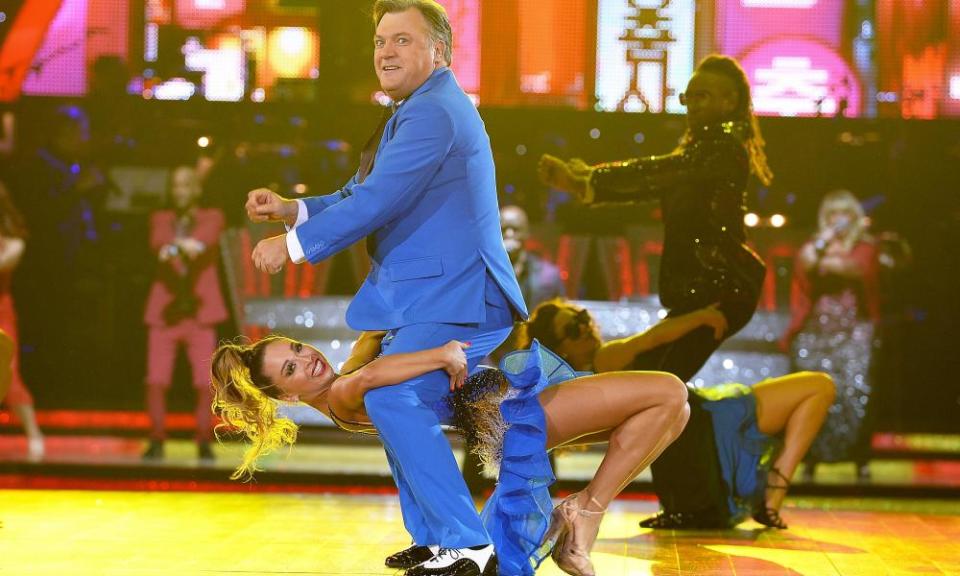I’m a Celebrity will be a nice little earner for Kezia Dugdale. But that’s it | Anne Perkins

Kezia Dugdale, the former leader of Scottish Labour, has jetted off to the Australian bush to join Ant and Dec and the cast of 12 in this year’s I’m a Celebrity. It would be fair to say her decision has split the entire country, and particularly Scottish Labour. Dugdale’s announcement came on the eve of the naming of the party’s new leader, Richard Leonard. The Dugdale affair overshadowed his first meeting with MSPs this afternoon where it was accepted she should not after all be suspended from the party, thereby agreeing with a call Jeremy Corbyn had already made.
The political row since the news broke on Friday has followed a familiar path – a bilious piece in the Scottish Daily Mail which is now mysteriously hard to access, a well-targeted tease from Nicola Sturgeon, tweeting her support for #teamkez, and a general atmosphere of outrage over an MSP taking well-paid time out from her day job. Dugdale was reportedly told by the party not to go, but went anyway, joining a roll of parliamentarians from Nadine Dorries to Penny Mordaunt who have tried reality TV as a career accelerant, with, it is only fair to say, mixed results.
Dugdale herself has not yet landed in the jungle, where the other contestants – not including many household names – are already breakfasting on bugs, weeping silently on camera etc etc. My money is on Stanley Johnson, father of Boris, who at some point will reveal that at his prep school funnel-web spiders were a delicacy and the washing facilities in the bush are a definite improvement.
Everyone who goes on a show like I’m a Celebrity takes a particular risk that is now so familiar from repeated experience it can only trigger a cacophany of mental warning klaxons, however limited a contestant’s perception of their place in the world. Dugdale cannot be surprised to discover that there is simply no interpretation of her decision that excludes her desire to a) earn a quick buck and b) feature in tabloid headlines. The lingering impression that Scottish Labour is a nest of vipers from which eight minutes in the panic pit with 40 pythons is a welcome break could reasonably described as unhelpful.
The interesting question is whether she can get something other than the pay cheque out of the exposure. Some of her political predecessors – Nadine Dorries Robert Kilroy-Silk and perhaps, sadly, least forgettably, George Galloway – merely confirmed pre-existing prejudices relating to narcissism, connectedness with the real world and unsuitability for public life, weaknesses that were swiftly identified by the voting public.
But Ed Balls managed to use Strictly Come Dancing to pull off a striking rehabilitation from a political career that had ended in ignominy when he lost his seat in 2015. On the other hand, Balls is not a man to be held back, least of all by self-doubt, and like Michael Portillo 20 years ago, he pivoted from defeat to recovery with a generous and elegant concession speech.

Strictly worked for Balls because he took it seriously but kept it in proportion. This is a handy life skill for anyone, but it is invaluable for politicians. But it also worked because it makes proper, recognisable and learnable demands of the contestants. No one can take the intentional nastiness of I’m a Celebrity, which reflects some of the deliberate humiliation that is at the heart of bullying, and make something better of it. The most contestants can hope for is to cling stoically to dignity and thus reveal a more admirable side of their character than the bit they exposed by agreeing to take part in the first place.
Strictly, on the other hand, teams the amateur with the professional and challenges them to aspire to the professional’s expertise. That requires a freakish combination of steeliness of purpose (trying to reach stratospheric skill levels) with an apparent lack of inhibition and even a streak of self-parody.
What to make, then of Mordaunt, the new international development secretary who fought her way out of political invisibility three years ago to take part in Splash!, a diving contest on ITV. Anyone reckless enough to try a back dive from a high board at any time, let alone on television, should probably be banned from any position of responsibility for ever.
Unusually, while name recognition in politics is usually the result of some epic political cock-up, Mordaunt’s advantage was that no one knew who she was when she started. Now she is in the cabinet there are an unusual number of pictures of her in a swimsuit, which in some quarters is preferable to knowing anything more of her politics except that she is a Brexiter.
Fighting back the thought that reality TV contests could catch on as an alternative to primaries or any other system of trying to assess parliamentary candidates, I can only say it might be wise to see how Mordaunt works out in her new job before advocating TV contests involving extreme hazard as anything other than a nice little earner.

 Yahoo News
Yahoo News 
